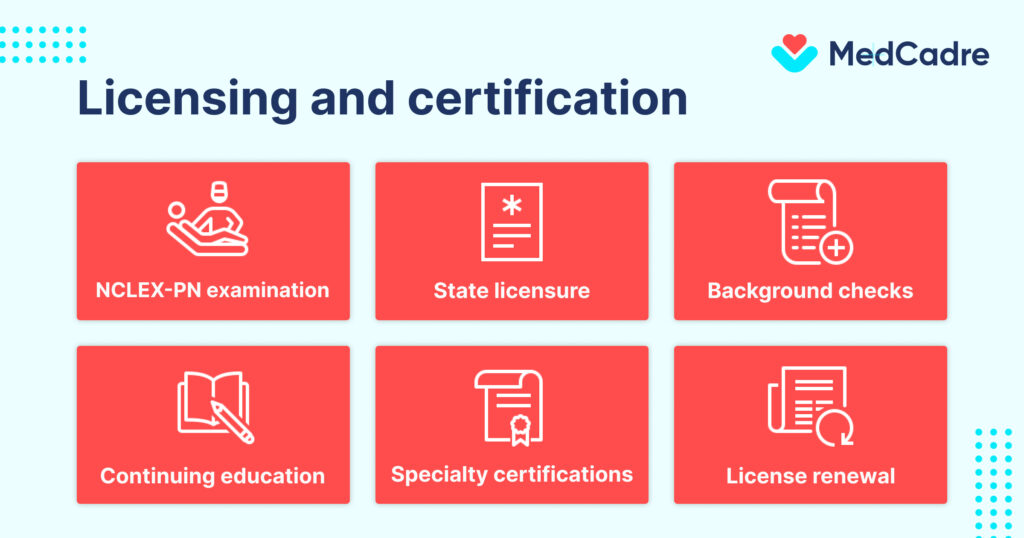For many Certified Nursing Assistants (CNAs) in the United States, advancing in their healthcare career is a natural next step. One common progression is transitioning from a CNA to LPN. Not only does this move offer increased responsibilities and better compensation, but it also provides an opportunity for personal and professional growth.
If you’re a CNA contemplating this transition, here’s a comprehensive guide on how to make that leap and boost your career prospects as a CNA to LPN and what other aspects you have to check before moving ahead to it like CNA vs LPN salary, and challenges. The article will help you to get into a deep understanding of each area.
Understanding the CNA vs LPN roles
Certified Nursing Assistant (CNA) responsibilities
Certified Nursing Assistants (CNAs) play a crucial role in patient care, focusing on assisting with daily activities and ensuring the comfort and well-being of individuals under their care.
CNAs typically provide hands-on assistance with tasks like bathing, dressing, and feeding. Their responsibilities extend to monitoring vital signs, reporting changes in patient conditions, and offering emotional support to patients and their families.
Licensed Practical Nurse (LPN) responsibilities
Licensed Practical Nurses (LPNs) operate with a more advanced scope of practice compared to CNAs.
LPNs are involved in administering medications, monitoring patients’ health, performing wound care, and collaborating with other healthcare professionals to develop and implement patient care plans.
LPNs bridge the gap between CNAs and Registered Nurses (RNs), providing a valuable link in the healthcare team, and the from CNA vs LPN salary is comparatively high.
Educational requirements for transitioning from CNA to LPN
Transitioning from a CNA vs LPN in the U.S. requires specific educational steps:
- High school diploma or GED: Start with a high school diploma or its equivalent, like a GED, to ensure foundational academic skills.
- Enroll in a state-approved LPN program: Complete a 12 to 18-month state-approved practical nursing program offered at community colleges, vocational schools, or technical institutes. Ensure the program is accredited by recognized bodies like ACEN or CCNE.
- Program curriculum: LPN programs combine theoretical coursework in anatomy, physiology, pharmacology, and patient care with hands-on clinical experience in various healthcare settings.
- Prerequisites and admission: Meet specific admission requirements, such as completing high school courses in biology and mathematics, passing entrance exams, submitting letters of recommendation, and undergoing background checks and health screenings.
- Clinical training: Engage in clinical rotations under supervision to gain practical skills in patient assessment, medication administration, wound care, and health promotion.
Gain hands-on experience
While completing your LPN education, leverage your experience as a CNA to gain hands-on clinical experience.
Volunteer for tasks that allow you to work closely with LPNs, such as administering medications under their supervision, assisting with patient assessments, and participating in care planning meetings.
This hands-on experience will enhance your clinical skills and demonstrate your commitment and readiness to transition into an LPN role.
Prepare for the NCLEX-PN exam
Upon completing your LPN program, the next step is to prepare for and pass the National Council Licensure Examination for Practical Nurses (NCLEX-PN). This standardized exam is a licensing requirement for aspiring LPNs in the U.S. The NCLEX-PN exam tests your knowledge and skills in patient care, health promotion, pharmacology, and legal and ethical considerations.
Invest in NCLEX-PN review materials, such as study guides, practice exams, and online resources. Develop a study plan that covers all exam content areas and allows ample time for review and practice tests. Consider joining a study group or enrolling in an NCLEX-PN review course to enhance your preparation and confidence.
Licensing and certification process for LPNs

When you go ahead to opt to become from CNA vs LPN, you always be aware of the steps you have to follow each way.
Here’s a concise overview highlighting key points to follow:
- NCLEX-PN examination: After completing an accredited LPN program, candidates must pass the National Council Licensure Examination for Practical Nurses (NCLEX-PN) to obtain licensure.
- State licensure: Upon passing the NCLEX-PN, applicants apply for state licensure through their respective state board of nursing, meeting specific requirements, and submitting necessary documentation.
- Background checks: Most states require LPN candidates to undergo criminal background checks, ensuring compliance with regulatory standards and ethical considerations.
- Continuing education: LPNs must fulfill continuing education requirements periodically, renewing their licenses and staying updated on nursing practices, regulations, and advancements.
- Specialty certifications: Pursuing specialty certifications in areas like gerontology, pediatrics, or IV therapy enhances LPNs’ expertise, career opportunities, and patient care capabilities.
- License renewal: LPNs must adhere to state-specific renewal timelines, complete required continuing education credits, and submit renewal applications to maintain active licensure status.
CNA vs LPN salary in the USA
| Factor | CNA | LPN |
| Median annual salary | $32,050 | $48,820 |
| Hourly wage | $15.41 | $23.47 |
| Salary range | $22,750 – $42,110 | $35,570 – $65,520 |
| Factors affecting salary | Location, Experience, Employer Type, Education (limited) | Location, Experience, Employer Type, Education (limited) |
| Overall | Lower earnings, but easier to qualify for | Higher earnings, but requires more education and training |
Career advancement opportunities from CNA to LPN
Licensed Practical Nurses (LPNs) possess various avenues for career advancement, leveraging their skills, experience, and education:
- Specialty certifications: LPNs can pursue specialty certifications in areas such as geriatrics, pediatrics, or IV therapy. These certifications enhance expertise, expand job opportunities, and potentially increase earning potential.
- Bridge programs: LPNs seeking further advancement can enroll in LPN-to-RN bridge programs, transitioning to Registered Nurse (RN) roles. These programs offer accelerated pathways, recognizing LPNs’ prior education and experience.
- Continuing education: Engaging in continuing education opportunities, workshops, and seminars keeps LPNs updated on industry trends, advancements, and best practices. Enhanced knowledge and skills can lead to specialized roles or leadership positions within healthcare settings.
- Advanced practice roles: LPNs can pursue advanced practice roles, such as becoming a Nurse Supervisor, Charge Nurse, or Clinic Manager, by demonstrating leadership skills, clinical expertise, and professional development.
- Higher education: LPNs aspiring for broader roles in healthcare administration, education, or advanced clinical practice can pursue higher education degrees, such as Bachelor of Science in Nursing (BSN) or Master of Science in Nursing (MSN), opening doors to diverse career paths and leadership positions.
Challenges and solutions for CNA vs LPN
Some common hurdles you have to face if you are looking to shift from CNA to LPN include managing educational demands, balancing work and study commitments, and adapting to increased responsibilities and scope of practice.
Also, financial constraints, limited resources, and obtaining relevant clinical experience can pose significant obstacles.
However, proactive planning, seeking mentorship, leveraging support networks, and accessing available resources can mitigate these challenges, ensuring a smooth transition and successful career advancement for LPNs.
| Challenges | Solutions |
| Managing educational demands | Develop a structured study plan, prioritize tasks, and utilize time-management strategies. |
| Balancing work and study commitments | Communicate with employers, explore flexible scheduling options, and establish a support system. |
| Adapting to increased responsibilities | Seek mentorship, participate in orientation programs, and gradually assume new roles and duties. |
| Financial constraints | Research financial aid options, scholarships, employer tuition reimbursement programs, and budget effectively. |
| Limited resources | Utilize available educational resources, online platforms, and community support networks. |
| Obtaining relevant clinical experience | Engage in hands-on training, volunteer opportunities, and clinical rotations to gain practical experience. |
Why MedCadre is the right solution for your next LPN job
MedCadre offers a tailored approach to help you secure your next from CNA to LPN job. Our experienced recruitment team carefully analyzes your profile, ensuring a personalized job placement aligned with your skills and aspirations.
To explore opportunities, simply submit your CV via our “Submit Your CV” portal or visit our career page and click “Apply Now.”
With MedCadre’s expertise and commitment, you can confidently advance your LPN career, accessing rewarding positions that match your goals within the dynamic healthcare industry.
Choose MedCadre as your trusted partner for career growth and success.
Wrapping it up
Switching from a CNA vs LPN is a big step in the healthcare world. We’ve talked about learning the roles, getting the right education, and handling the licensing process.
We also explored ways to boost your career as an LPN, like extra certifications and ongoing learning. Take all the considerations before jumping into any decision like CNA vs LPN salary, Challenges, and other aspects of as CNA to LPN.
MedCadre is helpful for finding LPN and other healthcare industry jobs. Their team checks your profile and makes sure you’re a good fit for the job you want.
You can drop your details to us through “Submit Your CV” or visit the career page and hit “Apply Now.” Our recruitment team will analyze your profile and give you a call once they find the right fit for you.
Becoming an LPN is a journey worth taking. Keep learning, growing, and trusting in yourself. With the right steps, you can shine in the exciting world of healthcare in the United States.


